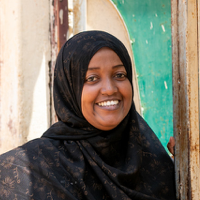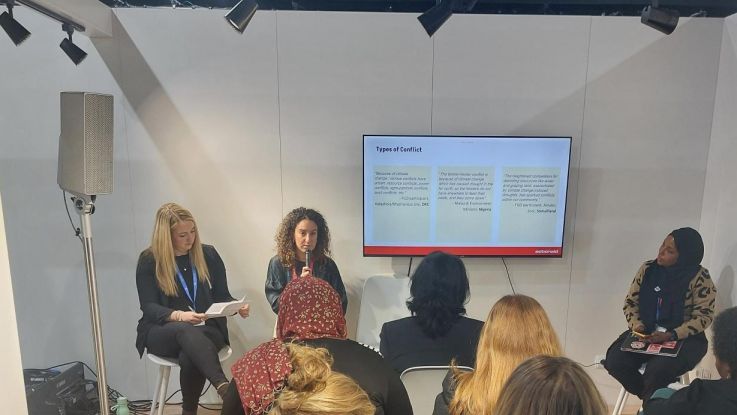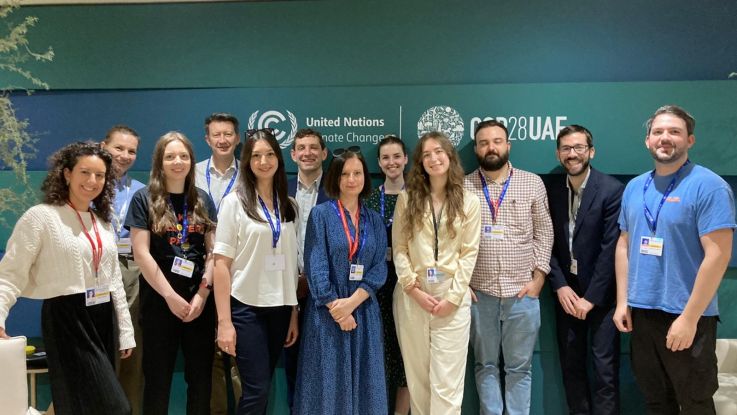Climate change in Somaliland: not just tomorrow's problem
6 November 2019
I’ve seen first-hand how the climate crisis is affecting women and girls living in poverty in Somaliland. This year, you can help.

Displacement camps in Somaliland are home to thousands. Photo: Karin Schermbrucker/ActionAid
In some of the world’s poorest places, hidden climate emergencies are devastating lives. Slow-building disasters, like droughts, rarely make the international news. But I’m from Somaliland, and I’ve seen first-hand the terrifying impact of these climate change-related emergencies.
My name is Hibo, I’m 33, and at ActionAid Somaliland it’s my job to work in the field supporting extremely vulnerable communities, whose lives have been torn apart by drought.
I work in emergency camps for people displaced by the crisis, identifying the community’s needs and ensuring aid and support gets to the people who need it most. I train women to take on leadership roles, facilitate women’s safe spaces, and work to eliminate violence against women – and support the women and girls who go through it.
Crucially, it’s essential I’m seen as a real part of the community here - not a staff member or a stranger, but a trusted, familiar face.
My job isn’t easy - and it doesn’t come with a manual. Each day brings new, heartbreaking challenges. But I know the climate crisis is putting more and more lives at risk every day - so I can’t wait. I’m taking action to save lives now.
How the climate crisis is affecting Somaliland
Somaliland has been suffering years of catastrophic drought, exacerbated by the changing climate.
Communities who once earned an income from the land, keeping livestock and selling meat or milk, have seen the fabric of their lives slowly frayed with each failing rain. Their lands parched and their herds long dead, families have been forced to abandon their homes in desperate search of food and water.
Many of them walk for months to reach the emergency camps. These vast stretches of sandy land, peppered with makeshift tents, are playing host to a crisis that the rest of the world knows little about.
Life in emergency camps in Somaliland
Here, families are living in unimaginable need.
Thousands of flimsy shelters are built from dry twigs and whatever cloth people can find, huddled together to withstand the harsh wind. Without doors or walls, their occupants are all too vulnerable to animal attacks or thieves.
And without proper sanitation, health facilities or toilets, sicknesses like diarrhea are common – made worse by the lack of nutritious food to eat or clean water to drink.
What would strike you the most though, if you visited, would be the sense of disquiet and precariousness. Lives are hanging in the balance. Families don’t know when their next meal will come, or if it will. And people wait bravely for rainfall, but they’re now facing one of the driest rainy seasons in three decades, making a desperate situation even more critical.
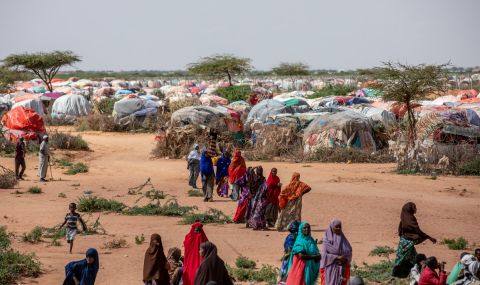
The sprawling emergency camps have no toilets, and very little food or water .
What ActionAid is doing to help
ActionAid staff are working around the clock here, to help people survive. We’re supplying women and girls with essentials kits, containing important items like underwear, soap, torches and whistles (members of the community are told that if they hear the sound of the whistle at night, they should go outside and see whether there is a problem).
We’re setting up, supporting and training women’s coalitions in each camp, empowering women to take on decision-making roles. With their help, we’re distributing cash transfers so that women can buy what they need for their families as quickly and cheaply as possible - including food, medicine, water and shelter.
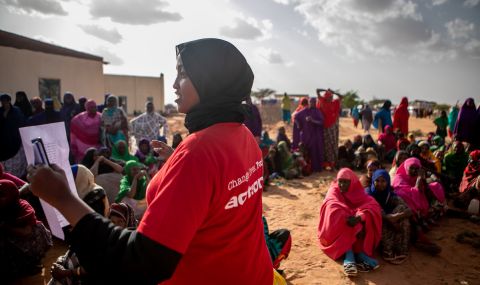
Hibo and colleagues distributing essentials kits to women in Somaliland .
Throughout all of this, we find small solace in the generous culture of sharing in Somaliland, meaning resources are always divided up, and families are constantly helping one another.
But life in the emergency camps is extremely difficult. Thousands who once owned livestock, and could earn a sustainable income, are now living on the very margins of survival. They have nowhere else to go, and they urgently need ActionAid’s help.
Why our focus is on supporting women and girls
After years of this devastation, we know women and girls are most vulnerable to the effects of the drought.
Not only are they suffering in the oppressive heat, with a lack of food and water, but women almost always carry the unseen burden of supporting their families, and putting their children first. Often husbands, brothers and sons go looking for work in towns and cities, leaving women to fend for their families alone.
Breastfeeding and pregnant women suffer particularly for the lack of nutritious food in the camps. And pregnant women face the added trauma of a childbirth with no medical facilities or trained midwives - women like Nafisa.
Giving birth in an emergency camp
At just 20 years old, Nafisa recently gave birth to her son. Women in the camp came together to help deliver the baby, but without medicine or trained professionals, it was an agonising experience for her.
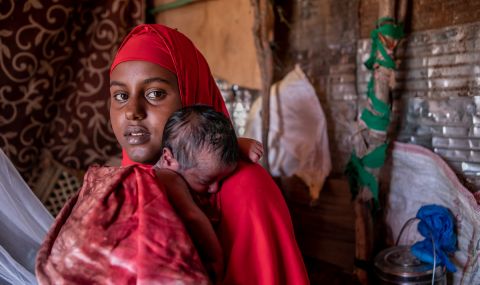
Nafisa had a traumatic childbirth in an emergency camp, like many other mothers .
When the baby arrived, Nafisa was too weak to move, and she had nothing to dress him in. Thankfully, ActionAid provided her with a package of essential care items for her and the baby, which has made the early days of motherhood easier. Many new mothers are even less lucky.
In this emergency, like all others, women and girls are at risk from other, unseen, threats, including sexual exploitation and trafficking. In desperation, families may sell off even very young daughters for marriage.
And every day, women and girls face the threat of sexual assault, domestic violence and rape. Simple things like security lights are one of the biggest needs here, to help women move around the camp feeling safe.
The lack of proper toilets is also a major problem for women. In search of privacy, and in order to feel less exposed, many women risk going to the toilet only twice a day, before sunrise and after sunset. This makes them even more vulnerable to sexual violence, or attacks from animals like hyenas.
Why empowering women and girls is crucial
Women and girls are exceptionally vulnerable here in Somaliland. But they are also a great source of strength – and an essential part of the solution.
We’ve seen that women’s coalitions have become the backbone of their communities, and are making a transformative difference to all those living here.
They know the needs of each family, are empowered to distribute aid and money to those who need it most, and when violence occurs, they help survivors access justice for crimes against them.
That’s why ActionAid’s unique approach to this crisis, putting women and girls at the heart of our response, is so important. We’re doing everything we can - but our resources are running out.
How you can help people in need in Somaliland
I’m grateful that, although the crisis in Somaliland may not make the international headlines, ActionAid can, and will, tell the story of the suffering I see here each day.
Because, despite the growing prominence of the climate crisis in 2019, I know this issue is often talked about as a problem for tomorrow - something lurking on the horizon, which the people in power will hope to fix in five, 10 or 20 years.
But here in Somaliland, the climate crisis is the reality of our everyday lives. It’s in the dead livestock, the failing rains and the traumatic experiences of women like Nafisa.
If you give just £3 a month to ActionAid you can help make sure we’re there for people today, tomorrow, and until we’re no longer needed. We won’t give up. So please spare whatever you can and make a life-saving donation.
